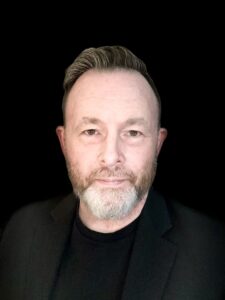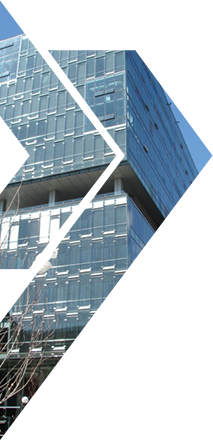2025 IANDIT Conference:
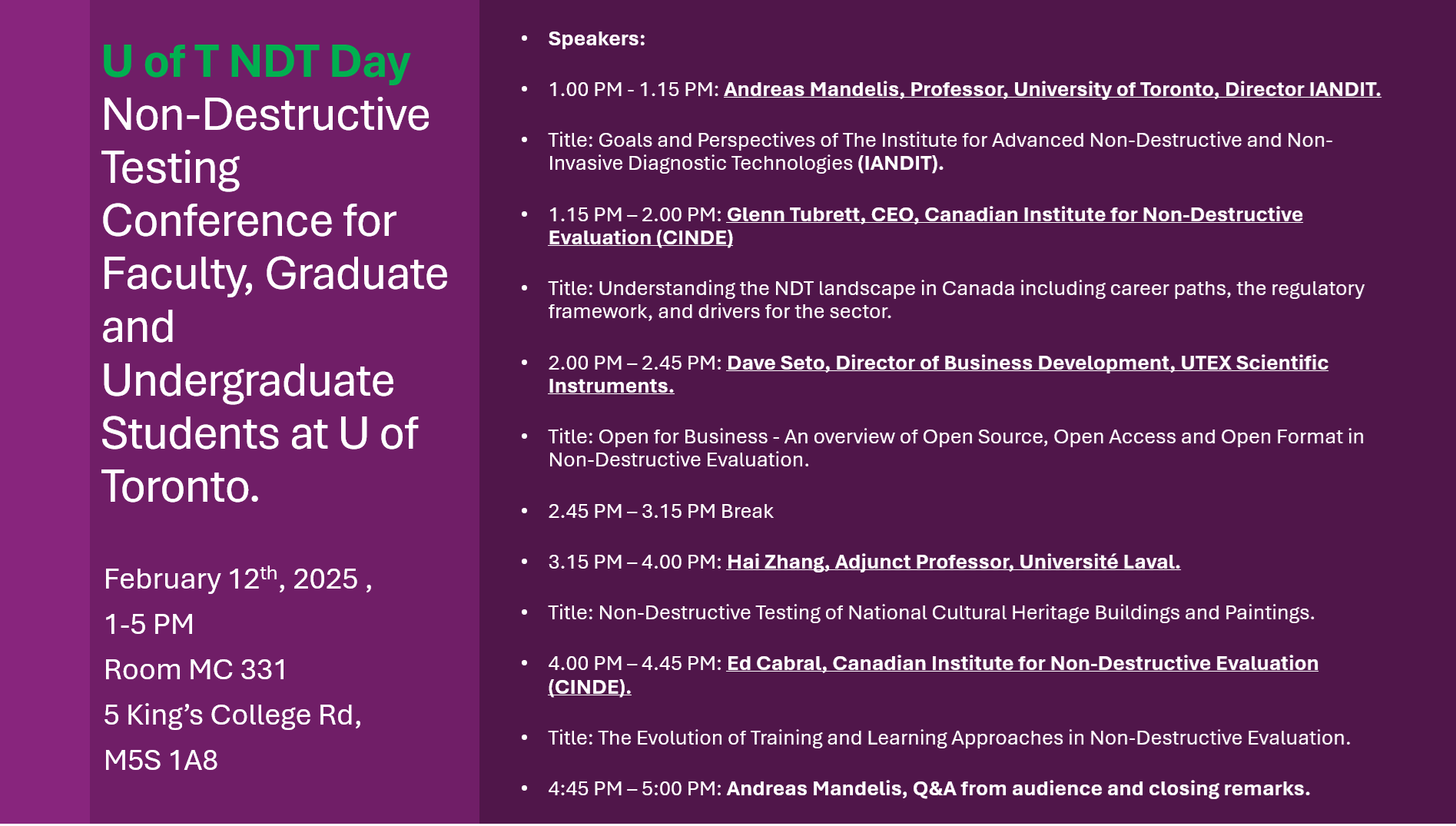
Wednesday, February 12, 2025
Room: MB 101: 1:00-5:00 PM
Mining Building (MB): 170 College St, Toronto, ON, M5S 3E3
https://goo.gl/maps/bVujArG4VdA7MHEo7
Hosted by: Institute for Advanced Non-Destructive and Non-Invasive Diagnostic Technologies (IANDIT), U of T ; https://iandit.mie.utoronto.ca/
2024 IANDIT Conference:
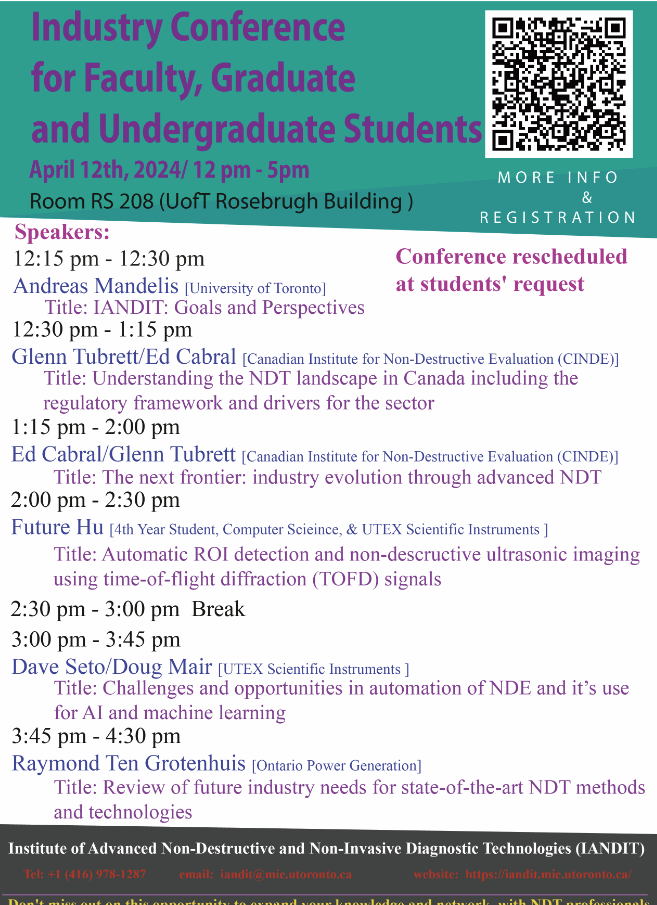
Friday, April 12, 2024
Room: RS 208: 12:00-5:00 PM
Rosebrugh Building (RS): 164 College St, Toronto, ON M5S 3E2
https://goo.gl/maps/bVujArG4VdA7MHEo7
Hosted by: Institute for Advanced Non-Destructive and Non-Invasive Diagnostic Technologies (IANDIT), UofT ; https://iandit.mie.utoronto.ca/
2023 IANDIT Seminar Series:
Plasmon-enhanced Fluorescence Induced Stimulated Raman Scattering as Non-destructive Non-linear Optical Method in Nanobiosensing and Bioimaging
Mohammad E. Khosroshahi
Nanobiophotonics & Biomedical Research Laboratory, MIS-Electronics Inc.,
Richmond Hill, Canada
Abstract
This work describes the generation and observation of multi-wavelengths due to stimulated Raman scattering (SRS) from deep red to near-infrared (NIR) induced by plasmon-enhanced fluorescence (PEF) of fluorescein isothiocyanate (FITC) conjugated gold nanoparticles (F-AuNP). The plasmonic solution was excited by a 488 nm diode laser and the PEF due to overlapping of FITC, and localized surface plasmon resonance (LSPR) of AuNP resonance peaks provided an efficient coupling between the near-field of LSPR of AuNPs as a nano-antenna and the molecules followed by an enhanced emission. Resonance Rayleigh scattering and PEF conditions are both satisfied. PEF acts as Stokes radiation and secondary pump beam for further optical excitation within the medium. Longer wavelengths with higher output power and shorter wavelengths with lower are detected at varying angles. Time-resolved PEF spectroscopy revealed the effect of enhanced emission followed by its quenching. In addition, F-AuNPs were incubated and taken up by the king oyster mushroom (KOM) grown in the lab studied by phase contrast microscope (PCM) and fluorescence microscope (FM). The results showed PEF and SRS visible colors within the mycelium hyphae. Therefore, it is concluded that non-linear optical mechanisms can be utilized for non-destructive biomedical applications such as invitro and in vivo contrast-enhanced fluorescence sensing and nano-bioimaging of cells and tissues as monitoring techniques.
Friday, June 9, 2023
Room: MC 301: 2:00-3:00 PM
5 King's College Rd, Toronto, ON M5S 3G8
https://goo.gl/maps/ydELUfzKjSCBZ9F27
Hosted by: Institute for Advanced Non-Destructive and Non-Invasive Diagnostic Technologies (IANDIT), UofT ; https://iandit.mie.utoronto.ca/
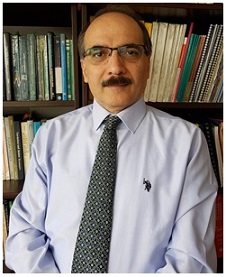
Mohammad E. Khosroshahi
Nanobiophotonics & Biomedical Research Laboratory, MIS-Electronics Inc.
Biography
Professor Mohammad E. Khosroshahi received his Ph.D. in Applied Physics (Application of Lasers in Medicine) from Hull University (UK) in 1993 with the thesis on ophthalmological tissue ablation with tunable mid-IR and excimer lasers in collaboration with Moorefields hospital in London. He joined the Biomaterial and Tissue Engineering group of the Faculty of Biomedical Engineering at Amirkabir University of Technology (AUT) in Tehran where he was a Full Professor. He has been the Director of AUT Laser and Optics Research Center, Associate Dean of Research, and Chair of Biomaterial Group. In 2013, he joined the University of Toronto, Department of Mechanical & Industrial Engineering (MIE) as a Visiting Professor working on ‘’Contrast-enhanced photoacoustic imaging of Tumor’’ at the Center for Advanced Diffusion-Wave and Photoacoustic Technologies (CADIPT). He then continued as a research associate at CADIPT working on the contrast-enhanced imaging of blood and became the faculty adjunct Professor in 2018.
Professor Khosroshahi is the author of two books: Laser Applications in Medicine, and Applications of Biophotonics and Nanobiomaterials in Biomedical Engineering, and co-author of two book chapters on Laser surface modification of titanium alloys as biomedical implants. He has published 110 peer-reviewed papers and has 2 patents and patent-pending related to nanobiosensors. His main research interests are Nanobiophotonics, Nanomedicine, Multifunction nanostructures, Targeted drug delivery, Targeted photothermal therapy, Guided bioimaging, biological chaos, Cancer thermodynamics, Optical detection of dental decay, Photoacoustic and Photothermal characterization. Currently, Professor Khosroshahi is Director of the Nanobiophotonics and Biomedical Research Lab at MIS-Electronics in Richmond Hill where he is working on the development of novel colloidal and substrate nanobiosensors based on the Plasmon-enhanced fluorescence spectroscopy (PEFS) and Enhanced-surface-enhanced Raman scattering (E-SERS) for targeted detection of breast cancer biomarkers such as HER-II and CA 15-3, dual-mode guided bioimaging, fluorescence microscopy, and contrast phase microscopy. He is a member of the Editorial Board of the Journal of Nanomedicine and Nanotechnology, a fellow member of the Institute of Nanotechnology, a member of the Canadian Association of Physics, Canadian Medical and Biological Engineering Society, Optical Society of America, and SPIE.
2023 IANDIT Seminar Series:
Non-Destructive Testing (NDT) Certification in Canada
Glenn Tubrett, CEO
Canadian Institute for Non-Destructive Evaluation (CINDE)
Hamilton, ON
Abstract
Non-destructive testing engineering is an area of rapid growth in Canada and internationally. Certifications in Non-Destructive Testing (NDT) in Canada are not only highly coveted nationally and internationally, but required for critical asset management/inspection conforming to specific regulations. This presentation will provide participants with the current processes for certification NDT in Canada from the perspective of the Canadian Institute for NDE (CINDE), Canada’s National NDT member society.
Wednesday, April 12, 2023
Room: RS 208: 12:00-1:00 PM
Rosebrugh Building (RS): 164 College St, Toronto, ON M5S 3E2
https://goo.gl/maps/bVujArG4VdA7MHEo7
Hosted by: Institute for Advanced Non-Destructive and Non-Invasive Diagnostic Technologies (IANDIT), UofT ; https://iandit.mie.utoronto.ca/
Glenn Tubrett, CEO
Biography
Glenn Tubrett is Chief Executive Officer at the Canadian Institute for Non-Destructive Evaluation (CINDE). CINDE is Canada’s not-for-profit, member-based, technical society dedicated to the people and companies engaged in non-destructive evaluation (NDE), non-destructive testing (NDT), and inspection.
Glenn holds a Bachelor of Electrical Engineering degree from Memorial University of Newfoundland. Prior to CINDE Glenn worked for over 20 years in various roles at the Canadian Standards Association focused on codes, standards, certification and legislation.
2022 IANDIT Seminar Series:
Industry Research and Development on Non-Destructive and Non-Invasive Diagnostic Technologies.
Health Sector Seminar Series:
“The Future of Drug Development through Companion Diagnostics and Therapeutics approaches”
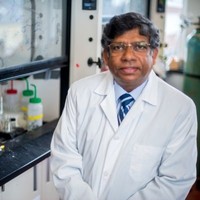
Nathan Yoganathan, President & Chief Scientific Officer
JN Nova Pharma Inc. (more info) https://jnnova.com/
Wednesday, December 7, 2022
RS 207: 2:00-3:00 PM
Rosebrugh Building (RS): 164 College St, Toronto, ON M5S 3E2
https://goo.gl/maps/bVujArG4VdA7MHEo7
Abstract: Dr. Nathan Yoganathan, President & CSO of JN Nova Pharma will be presenting their novel technology. JN Nova is a pre-clinical-stage biopharmaceutical company, focused on efficiently developing innovative treatments that address significant unmet medical needs. JN Nova’s lead product candidate, JN2019 is a novel anti-COVID-19 molecule. The company is collaborating with Canadian Government labs and Canadian academic centers to accelerate its COVID-19 therapeutic development. This proprietary drug class blocks pan-COVID infection from all variants, with important renal, cardiovascular, and pulmonary protective properties. The lead therapeutic molecules are corona-viral neutralizing agents which trap and inhibit viral entry to the lungs via an enhanced ACE2 enzymatic decoy and cause viral clearance via immunological conjugation and have full ACE2 enzyme replacement activity, supporting protection from acute kidney injury and enhanced recovery from the acute respiratory syndrome in ICU settings. Extremely potent vs emergent viral variants: drugs will be developed as accessible, rapidly administered therapeutic interventions in symptomatic pre-hospitalized and early symptomatic hospitalized patients for people that are infected by these vaccine-escape mutants, such as Delta, Omicron, and beyond.
The Institute for Advanced Non-Destructive and Non-Invasive Diagnostic Technologies (IANDIT) in the Faculty of Applied Science and Engineering presents its inaugural guest speaker seminar series with Dr Nathan Yoganathan. The IANDIT seminar series features leading experts in Non-Destructive Evaluation (NDE) and Non-Invasive Bio-diagnostics (NIB) research in manufacturing industry and healthcare sector in Ontario and beyond.
JN Nova is interested in collaborating with UofT scientists and engineers to develop non-invasive COVID-19 related technologies including detection and treatment.
Interested members of the U of T community who would like to attend the seminars and meet the speaker can email to iandit@mie.utoronto.ca.
Biography
Dr. T. Nathan Yoganathan is currently the President and Chief Scientific Officer of JN Nova Pharma Inc. Dr. Yoganathan is a university and industrial research scientist, turned entrepreneur who became an experienced CEO, having successfully launched several private and a public biotechnology companies. He has over twenty-five years of experience in scientific research in cell signaling and gene expression technology and instrumentation, has published several articles, and is an inventor of many patents.
Dr. Yoganathan is the recipient of numerous awards, including from the Natural Sciences and Engineering Research Council of Canada, and the Thyroid Foundation of Canada. He serves on a number of advisory boards for both government and industry, including the CIHR Strategic Training Program in the Bioinformatics Advisory Board, BIOTE Canada's Emerging Companies Advisory Board, and past member of the Ontario Research Fund Advisory Board. He was elected as a Fellow of the Royal Society of Biology. Dr. Yoganathan was a faculty member of the Department of Medicine at the University of Toronto, and was affiliated with the Lunenfeld and Tanenbaum Research Institute of Mount Sinai Hospital. He holds a B.Sc. (Honours) from the University of North London, a M.Sc. from the University of Sussex, and a Ph.D. from the University of Oslo.
SPIE Conference Presentation:
Proceedings Volume 13047, Thermosense: Thermal Infrared Applications XLVI; 130470U (2024) https://doi.org/10.1117/12.3025043
Event: SPIE Defense + Commercial Sensing, 2024, National Harbor, Maryland, United States
Andreas Mandelis, IANDIT, CADIPT, University of Toronto.
Title:
SPIE Conference Presentation:
Proceedings Volume 13047, Thermosense: Thermal Infrared Applications XLVI; 130470U (2024) https://doi.org/10.1117/12.3025043
Event: SPIE Defense + Commercial Sensing, 2024, National Harbor, Maryland, United States
Andreas Mandelis, IANDIT, CADIPT, University of Toronto.
Title:
2023 IANDIT Seminar Series:
Plasmon-enhanced Fluorescence Induced Stimulated Raman Scattering as Non-destructive Non-linear Optical Method in Nanobiosensing and Bioimaging
Mohammad E. Khosroshahi
Nanobiophotonics & Biomedical Research Laboratory, MIS-Electronics Inc.,
Richmond Hill, Canada
Abstract
This work describes the generation and observation of multi-wavelengths due to stimulated Raman scattering (SRS) from deep red to near-infrared (NIR) induced by plasmon-enhanced fluorescence (PEF) of fluorescein isothiocyanate (FITC) conjugated gold nanoparticles (F-AuNP). The plasmonic solution was excited by a 488 nm diode laser and the PEF due to overlapping of FITC, and localized surface plasmon resonance (LSPR) of AuNP resonance peaks provided an efficient coupling between the near-field of LSPR of AuNPs as a nano-antenna and the molecules followed by an enhanced emission. Resonance Rayleigh scattering and PEF conditions are both satisfied. PEF acts as Stokes radiation and secondary pump beam for further optical excitation within the medium. Longer wavelengths with higher output power and shorter wavelengths with lower are detected at varying angles. Time-resolved PEF spectroscopy revealed the effect of enhanced emission followed by its quenching. In addition, F-AuNPs were incubated and taken up by the king oyster mushroom (KOM) grown in the lab studied by phase contrast microscope (PCM) and fluorescence microscope (FM). The results showed PEF and SRS visible colors within the mycelium hyphae. Therefore, it is concluded that non-linear optical mechanisms can be utilized for non-destructive biomedical applications such as invitro and in vivo contrast-enhanced fluorescence sensing and nano-bioimaging of cells and tissues as monitoring techniques.
Friday, June 9, 2023
Room: MC 301: 2:00-3:00 PM
5 King's College Rd, Toronto, ON M5S 3G8
https://goo.gl/maps/ydELUfzKjSCBZ9F27
Hosted by: Institute for Advanced Non-Destructive and Non-Invasive Diagnostic Technologies (IANDIT), UofT ; https://iandit.mie.utoronto.ca/

Mohammad E. Khosroshahi
Nanobiophotonics & Biomedical Research Laboratory, MIS-Electronics Inc.
Biography
Professor Mohammad E. Khosroshahi received his Ph.D. in Applied Physics (Application of Lasers in Medicine) from Hull University (UK) in 1993 with the thesis on ophthalmological tissue ablation with tunable mid-IR and excimer lasers in collaboration with Moorefields hospital in London. He joined the Biomaterial and Tissue Engineering group of the Faculty of Biomedical Engineering at Amirkabir University of Technology (AUT) in Tehran where he was a Full Professor. He has been the Director of AUT Laser and Optics Research Center, Associate Dean of Research, and Chair of Biomaterial Group. In 2013, he joined the University of Toronto, Department of Mechanical & Industrial Engineering (MIE) as a Visiting Professor working on ‘’Contrast-enhanced photoacoustic imaging of Tumor’’ at the Center for Advanced Diffusion-Wave and Photoacoustic Technologies (CADIPT). He then continued as a research associate at CADIPT working on the contrast-enhanced imaging of blood and became the faculty adjunct Professor in 2018.
Professor Khosroshahi is the author of two books: Laser Applications in Medicine, and Applications of Biophotonics and Nanobiomaterials in Biomedical Engineering, and co-author of two book chapters on Laser surface modification of titanium alloys as biomedical implants. He has published 110 peer-reviewed papers and has 2 patents and patent-pending related to nanobiosensors. His main research interests are Nanobiophotonics, Nanomedicine, Multifunction nanostructures, Targeted drug delivery, Targeted photothermal therapy, Guided bioimaging, biological chaos, Cancer thermodynamics, Optical detection of dental decay, Photoacoustic and Photothermal characterization. Currently, Professor Khosroshahi is Director of the Nanobiophotonics and Biomedical Research Lab at MIS-Electronics in Richmond Hill where he is working on the development of novel colloidal and substrate nanobiosensors based on the Plasmon-enhanced fluorescence spectroscopy (PEFS) and Enhanced-surface-enhanced Raman scattering (E-SERS) for targeted detection of breast cancer biomarkers such as HER-II and CA 15-3, dual-mode guided bioimaging, fluorescence microscopy, and contrast phase microscopy. He is a member of the Editorial Board of the Journal of Nanomedicine and Nanotechnology, a fellow member of the Institute of Nanotechnology, a member of the Canadian Association of Physics, Canadian Medical and Biological Engineering Society, Optical Society of America, and SPIE.
2023 IANDIT Seminar Series:
Non-Destructive Testing (NDT) Certification in Canada
Glenn Tubrett, CEO
Canadian Institute for Non-Destructive Evaluation (CINDE)
Hamilton, ON
Abstract
Non-destructive testing engineering is an area of rapid growth in Canada and internationally. Certifications in Non-Destructive Testing (NDT) in Canada are not only highly coveted nationally and internationally, but required for critical asset management/inspection conforming to specific regulations. This presentation will provide participants with the current processes for certification NDT in Canada from the perspective of the Canadian Institute for NDE (CINDE), Canada’s National NDT member society.
Wednesday, April 12, 2023
Room: RS 208: 12:00-1:00 PM
Rosebrugh Building (RS): 164 College St, Toronto, ON M5S 3E2
https://goo.gl/maps/bVujArG4VdA7MHEo7
Hosted by: Institute for Advanced Non-Destructive and Non-Invasive Diagnostic Technologies (IANDIT), UofT ; https://iandit.mie.utoronto.ca/
Glenn Tubrett, CEO
Biography
Glenn Tubrett is Chief Executive Officer at the Canadian Institute for Non-Destructive Evaluation (CINDE). CINDE is Canada’s not-for-profit, member-based, technical society dedicated to the people and companies engaged in non-destructive evaluation (NDE), non-destructive testing (NDT), and inspection.
Glenn holds a Bachelor of Electrical Engineering degree from Memorial University of Newfoundland. Prior to CINDE Glenn worked for over 20 years in various roles at the Canadian Standards Association focused on codes, standards, certification and legislation.
2022 IANDIT Seminar Series:
Industry Research and Development on Non-Destructive and Non-Invasive Diagnostic Technologies.
Health Sector Seminar Series:
“The Future of Drug Development through Companion Diagnostics and Therapeutics approaches”

Nathan Yoganathan, President & Chief Scientific Officer
JN Nova Pharma Inc. (more info) https://jnnova.com/
Wednesday, December 7, 2022
RS 207: 2:00-3:00 PM
Rosebrugh Building (RS): 164 College St, Toronto, ON M5S 3E2
https://goo.gl/maps/bVujArG4VdA7MHEo7
Abstract: Dr. Nathan Yoganathan, President & CSO of JN Nova Pharma will be presenting their novel technology. JN Nova is a pre-clinical-stage biopharmaceutical company, focused on efficiently developing innovative treatments that address significant unmet medical needs. JN Nova’s lead product candidate, JN2019 is a novel anti-COVID-19 molecule. The company is collaborating with Canadian Government labs and Canadian academic centers to accelerate its COVID-19 therapeutic development. This proprietary drug class blocks pan-COVID infection from all variants, with important renal, cardiovascular, and pulmonary protective properties. The lead therapeutic molecules are corona-viral neutralizing agents which trap and inhibit viral entry to the lungs via an enhanced ACE2 enzymatic decoy and cause viral clearance via immunological conjugation and have full ACE2 enzyme replacement activity, supporting protection from acute kidney injury and enhanced recovery from the acute respiratory syndrome in ICU settings. Extremely potent vs emergent viral variants: drugs will be developed as accessible, rapidly administered therapeutic interventions in symptomatic pre-hospitalized and early symptomatic hospitalized patients for people that are infected by these vaccine-escape mutants, such as Delta, Omicron, and beyond.
The Institute for Advanced Non-Destructive and Non-Invasive Diagnostic Technologies (IANDIT) in the Faculty of Applied Science and Engineering presents its inaugural guest speaker seminar series with Dr Nathan Yoganathan. The IANDIT seminar series features leading experts in Non-Destructive Evaluation (NDE) and Non-Invasive Bio-diagnostics (NIB) research in manufacturing industry and healthcare sector in Ontario and beyond.
JN Nova is interested in collaborating with UofT scientists and engineers to develop non-invasive COVID-19 related technologies including detection and treatment.
Interested members of the U of T community who would like to attend the seminars and meet the speaker can email to iandit@mie.utoronto.ca.
Biography
Dr. T. Nathan Yoganathan is currently the President and Chief Scientific Officer of JN Nova Pharma Inc. Dr. Yoganathan is a university and industrial research scientist, turned entrepreneur who became an experienced CEO, having successfully launched several private and a public biotechnology companies. He has over twenty-five years of experience in scientific research in cell signaling and gene expression technology and instrumentation, has published several articles, and is an inventor of many patents.
Dr. Yoganathan is the recipient of numerous awards, including from the Natural Sciences and Engineering Research Council of Canada, and the Thyroid Foundation of Canada. He serves on a number of advisory boards for both government and industry, including the CIHR Strategic Training Program in the Bioinformatics Advisory Board, BIOTE Canada's Emerging Companies Advisory Board, and past member of the Ontario Research Fund Advisory Board. He was elected as a Fellow of the Royal Society of Biology. Dr. Yoganathan was a faculty member of the Department of Medicine at the University of Toronto, and was affiliated with the Lunenfeld and Tanenbaum Research Institute of Mount Sinai Hospital. He holds a B.Sc. (Honours) from the University of North London, a M.Sc. from the University of Sussex, and a Ph.D. from the University of Oslo.
